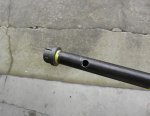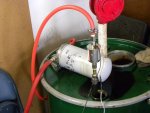Only use WMO in a multifuel diesel. Not any other Diesel engine. The multifuel has a special injector and piston design.
In a non multifuel diesel it will clog the injectors which spray a very fine mist into the combustion chamber.
The multifuel sprays a larger stream of fuel into a pocket in the top of the piston.
That is a great explanation of what makes it multifuel.
That all said, there are a lot of guys running WMO blends in Fords, Mercedes, Dodges, Kubotas, etc. I think Dieselstop.com is where I saw all that. 50-50 is the most common blend.
The newer automotive diesels with the pollution controls won't work with WMO but most older diesels will.
I am going to try a WMO blend, probably hydraulic oil actually, in my 701a genset. Will report back here with success or disaster stories.
Edit: Deuce stock fuel filters are designed to take out common contaminates: dirt, fir needles, rust flakes, crap like that, and still deliver fuel to the injectors so that the truck will run when it really needs to. The fuel system on these trucks does not appear to be designed to run as a 200,000 mile per motor system. It is designed for battlefield use. So that is why we can get by just fine dumping WMO direct in our fuel tank and the truck still runs. That is how the truck is designed to operate.
Now if you love your deuce as I do, and don't want to be wrenching on it all the time, you will read ~all~ of the Alternative Fuels threads as I have. That is called RTFM. It takes about three full days. Let me summarize for those less patient:
You would learn that even though that used motor oil burns just fine in your mulitfuel, it contains lots and lots of those pesky carbon particles, AKA Soot. They are a byproduct of combustion and have an abrasive effect on your injectors. So if you just dump used motor oil in your fuel tank right after an oil change, most of the metal particles will probably settle to the bottom of the tank. The black stuff, loaded with suspended carbon and metal particles, will burn nicely in your Multifuel engine, and prematurely wear out your injectors. If you only drive your truck once a month, probably no big deal while you own it. If you plan to own it a long time, or drive it a lot, then it might be a big deal. Especially if you were thinking to depend on it to run nicely when you ~really needed it~.
This;;; is why serious WMO burners either clean their WMO with a centrifuge before calling it fuel, or run it through several stages of filtering, probably 1-5 microns in the final pass.





